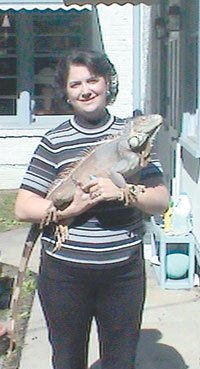Wayne woman brings help to iguanas
By Sam Atkins
Published in News on October 8, 2004 1:59 PM
Every dog has its day, but how about iguanas?
Various groups advocate for unwanted cats and dogs, but one Wayne County woman has found a need to speak up for her reptilian pet.
Johnna Nelson is a member of Triangle Iguana Rescue, a nonprofit organization that serves North Carolina. Its goal is to provide iguana owners with information about how to properly care for their reptilian pets.

Johnna Nelson
She adopts unwanted iguanas and takes care of them until she can find a proper home for them. She also has two iguanas of her own, including "Baby," which has grown over the past six year to nearly 52 inches long and 10 pounds.
She said there are thousands of iguanas imported into the United States every year and only 10 percent survive, mainly because people do not realize how much work goes into caring for them and that they get a lot bigger over the years.
Ms. Nelson traveled to the Wayne Regional Agricultural Fair on Thursday and saw iguanas being given away as prizes for winning a carnival game. She said they were being kept in cold water under a 60-watt bulb, which is not warm enough.
One of the iguanas had its tail breaking off. She offered to buy it, but the fair employee would not let her. She said the employee was friendly and willing to take some pamphlets about the proper care of iguanas and hand them out. He also said he would mention the concern to his boss, who would contact her by e-mail.
She said they have been giving iguanas away at the fair for at least the past seven years, and she is concerned that the winners do not have the slightest idea about what needs to be done to take care of them.
Milton Ingram, fair manager, said he did not realize that the carnival employee was giving them out and plans to speak with the carnival about the concerns. He said fair organizers try to eliminate anything at the fair that is controversial.
Ms. Nelson said the Triangle Iguana Rescue has helped ban the selling or giving away of iguanas at the N.C. State Fair and some other county fairs in the state.
She originally became introduced to iguanas in August of 1998 when her son decided he wanted one. They took "Baby" to his school for a report he was doing on iguanas. The next day it started breathing through its mouth and the vet said it had a respiratory infection.
She learned a lot about the reptile from that experience and started doing research on line and found out things she was doing wrong in caring for it. She said she would not have bought the iguana if she knew then what she knows now. But now she loves it.
She bathes and feeds it daily and holds it for 15- to 20-minute sessions at least twice a day. She has a separate room in her home for the iguanas and one is in her bedroom.
Iguanas can weigh up to 25 pounds and can live a long time, depending on how they are cared for. They have many special needs, including a specific food and habitat requirements.
They are herbivores and require fairly high amounts of calcium. Their diet should consist of fresh greens and vegetables like green beans, okra, peas. They should not be fed dog or cat food, mice, insects or milk products, she said.
If they are kept in an enclosure, it should be a very large one with a heat source like a basking light or ceramic heating element. Hot rocks and heated branches should not be used. Daytime temperatures should be no cooler than 80 to 85 degrees, with a 90- to 95-degree basking area, she said.
They should be taken to the vet regularly for checkups ,and regular cleaning of their environment is necessary to prevent salmonella. Adult iguanas can be aggressive, especially during breeding season, and can cause injury by biting and tail whipping.
She hopes people will learn more about iguanas before buying them in the store or getting them at the fair.
"We just want to make people more aware of what is involved," she said.
